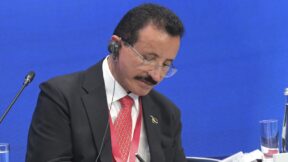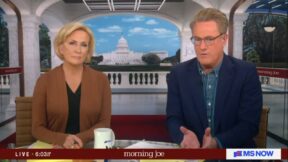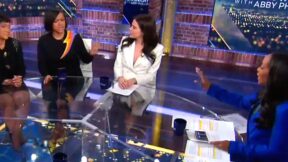Joe Biden Was Asked About a Republican Running Mate in 2007, Here’s What He Said Then
Former Vice President and Democratic presidential candidate Joe Biden got a lot of attention this week by saying he would “consider” a Republican running mate, but this isn’t the first time he’s been asked about that prospect, and reacted with an answer that fell short of “Republicans can all go pound sand,” or “Can you find me one who doesn’t idolize an overt racist?”
I thought about titling this column “Here’s the Full Context of Joe Biden’s Remark About Considering a Republican Running Mate,” then playing the full video of his answer, and explaining that the context is that Republicans are horrible. But instead, let me first just play you the entirety of Biden’s remarks at a town hall event on Monday, where he was asked if he would consider a Republican as his running mate.
So, yes, it was a long answer, much of which did not concern the heresy he spoke, but the part that’s getting all the attention is his response that “The answer is I would but I can’t think of one now.”
The audience laughed, and some surmised that Biden was joking, which he immediately undermined by saying “No, I’m serious” and explaining that “There’s some really decent Republicans that are out there still, but here’s the problem right now,”but that “they’ve gotta step up.”
Now, I’m sure everyone knows that this is just Biden’s way of reassuring general election voters that he doesn’t hate Republicans with the well-deserved heat of a thousand suns, which he has been doing all along by insisting that he’s uniquely suited to being able to work with them after he’s elected president, and they all have an epiphany. And as my headline suggests, this isn’t the first time he’s responded to this sort of hypothetical.
At a presidential debate in 2007, Biden was asked “If you had to pick any Republican member of Congress or Republican governor to be your running mate, who would it be?”
Instead of saying the equivalent of “I’d shoot Toby twice,” Biden rattled off two names.
“At the risk of hurting his reputation — and it will hurt him — but I would pick Chuck Hagel, and I’d consider asking Dick Lugar to be secretary of state,” Biden said.
Not-yet-disgraced then-Senator John Edwards agreed about Hagel, but said “Do you believe that compromise, triangulation will bring about big change? I don’t.”
He went on to add that powerful people won’t give up power on their own, and If you want real change, you need somebody who’s taking these people on and beating them over and over and over.”
Biden’s answer was essentially in line with what impending President Barack Obama would go on to do, not only naming Hagel his secretary of defense but taking every opportunity he could to work with — or look like he was working with — Republicans.
Frankly, it drove a lot of us nuts. It was effective politics on one level — allowing Republicans to expose their own bad faith with demonstrations of his own good faith. That’s what many of us are hoping Biden is up to now, that this is just some shit he feels he has to say.
But it also translated into bad — sometimes disastrous — policy, as when Obama and the Democrats dragged out the Obamacare process trying to get Republicans to buy in, only to lose their supermajority and barely squeak the law through under reconciliation.
Or the Recovery Act, which ended up with a huge chunk of Republican tax cuts instead of spending, or the disastrous debt ceiling deal that gave us the sequester.
In those instances, Obama and the Democrats would have been better off listening to Edwards, even if they still talked like Biden.
Biden’s instinct to reassure general election voters is a good one, although even the most modest profession of bipartisan optimism sounds hopelessly naive in a post-Merrick Garland world. The former VP himself seemed to recognize the need to calibrate his bipartisan instincts when he was asked about his “epiphany” theory at the last debate.
He explained that the opposition would at least no longer have Trump as an obstacle to cooperation, but explained that he had “no love” for the Republicans, and that “when we can’t convince them, we go out and beat them like we did in the 2018 election in red states and in purple states.”
That was a good answer. Not because it made me happy, since my preference would have been some suggestion that Republicans become intimately acquainted with themselves in an anatomically difficult fashion.
But it was enough to earn praise from CNN commentator and former Hillary Clinton senior advisor Jess McIntosh, who is not exactly high on Biden’s candidacy, but whom I consider to be the exemplar of a smart, engaged, and sensible Democratic primary voter. That’s who every Democratic candidate needs to excite now, and not to alienate next November.
Watch Biden’s 2007 response above via CNN.
This is an opinion piece. The views expressed in this article are those of just the author.
New: The Mediaite One-Sheet "Newsletter of Newsletters"
Your daily summary and analysis of what the many, many media newsletters are saying and reporting. Subscribe now!






Comments
↓ Scroll down for comments ↓